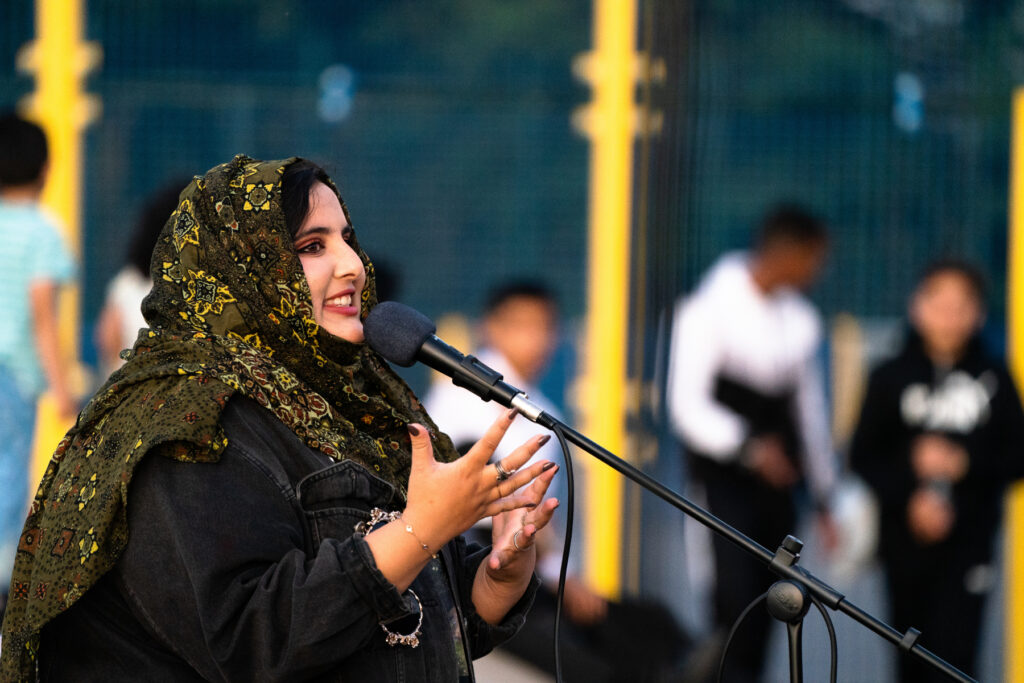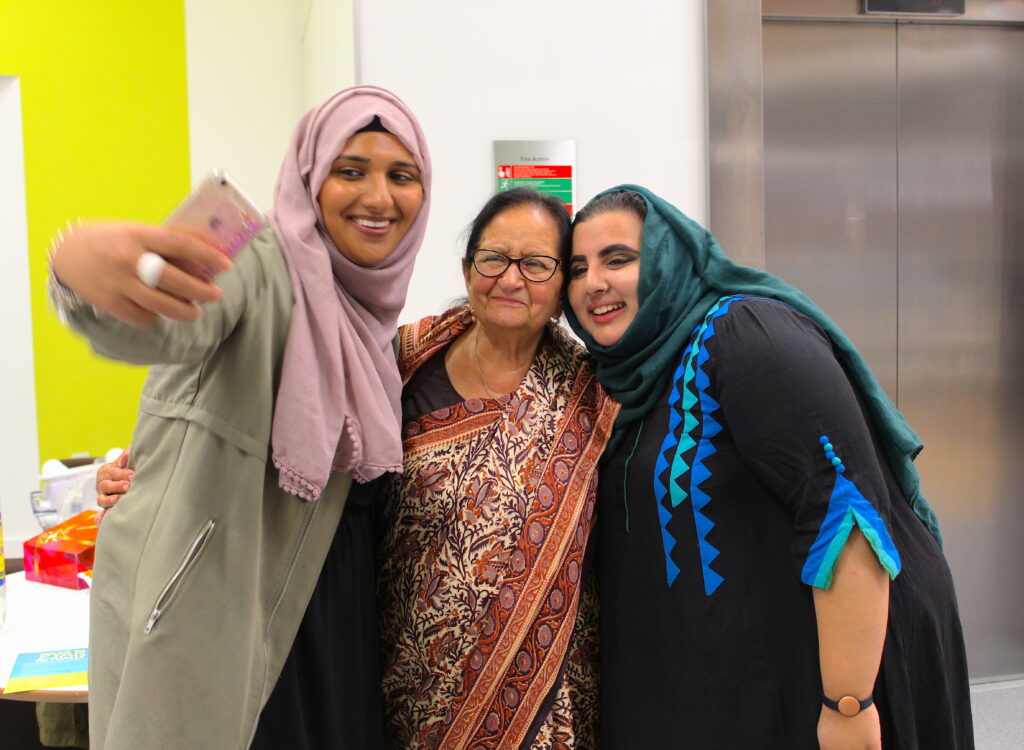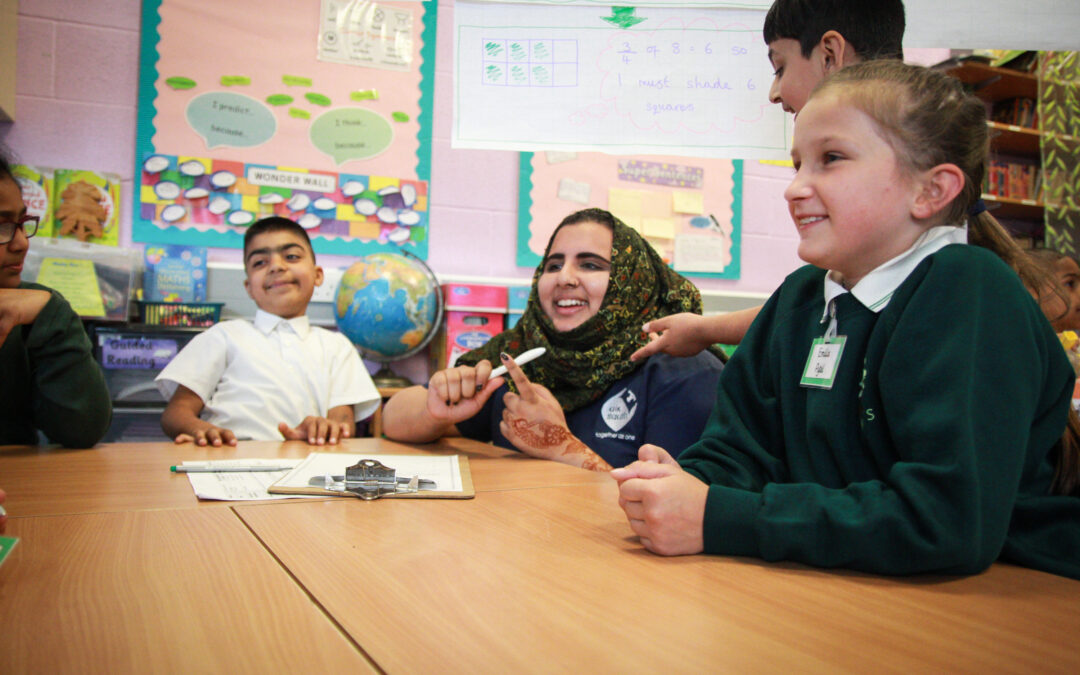Talented poet and cultural history enthusiast Saleha Latif volunteered with Together As One (Aik Saath) as a young person to deliver anti-racism presentations in schools across Slough. She quickly found her calling working on heritage and cultural projects. Here, she chats to us about building confidence, life-changing projects and how TAO led her to a career at the Tate.
When did you first engage with TAO, and how did you get involved?
I’ve always had a passion for arts and culture, so much so that as a 9-year-old I dreamed of working in a museum. A bit odd for a child, I know, but I love learning about history and how people lived. Because of this interest, I volunteered at the Slough Museum (when it was a big museum before the pods in the current library). The museum staff used to work with TAO on various projects, so that’s how I became involved.
In 2014, the Slough Museum Learning Officer, Charlotte, left to join TAO. She invited me to join the Mygration project, where young people interviewed Slough residents from different backgrounds about their stories of moving to the town.
I’d just moved schools for sixth form and found the transition hard. I felt I’d lost my self-confidence, but working on the project helped me feel I was a part of something. Hearing the lost stories was empowering. It solidified that I wanted to work in this field in some capacity.
With TAO, I began to attend the volunteering meetings, slowly getting more and more involved. I delivered workshops in schools around prejudice and anti-racism. I also started attending Empoword events as a spectator before building the confidence to get behind the mic! But, the projects that dove into Slough’s history and culture really lit me up.

Saleha performs at Poetry in the Park (2019)
You’ve worked on some amazing heritage and cultural projects interviewing different people in Slough. Can you tell us about 17,000 Reasons to Remember?
The aim of 17,000 Reasons to Remember was to give a voice to the Polish fighter pilots whose stories were lost to history. They contributed to the UK war effort during WWII, yet were forgotten. We wanted to fulfil the need to tell their stories.
This project meant a lot to me because multiculturalism is about sharing mixed stories as well as mixed faces. Existing side by side without getting to know your neighbour isn’t true multiculturalism. It’s important we recognise and understand each other. We often think racism is about skin colour, but it’s more likely xenophobia.
That’s why it was key to share these Polish stories. Even on a personal level, I learned so much about the culture and identity.
The veterans we interviewed shared touching stories about fleeing their homes, coming to terms with their exile and fighting for the freedom of their country and the UK. I’ve always been a compassionate person (I’m the kind of person who cries at museums), so this was definitely an emotional experience I’ll never forget.
What about Partition Women’s Voices?
This project was my baby. Partition Women’s Voices told the stories of the women who lived through the Partition of British India into India and Pakistan.
I was lucky enough to work with TAO as a staff member for this project, which was really meaningful. If you can imagine what the 17,000 Reasons to Remember project did to me, then this was very emotionally touching!
At the time, I was studying literature at SOAS University of London where I was already knee-deep in this world of cultural research. This project came at just the right moment. It connected me to my heritage and family in a way we hadn’t been before. All of a sudden, I was asking the women in my life hard questions about partition.
I was involved at every stage, and I poured my heart and soul into it. I guess you could call it the magnum opus of my work with TAO. I loved how much I was mentored, supported and encouraged by the team. I learned so many soft skills, like how to take notes and not be an idiot in a meeting. Everything that’s vital to my current job!
Whilst I did have the time of my life and could feel myself grow as a person, it was still very heavy. Sometimes I’d go home and cry. These women lived through such hard times but no one was thinking about them. Their stories were completely neglected. It was empowering to present their narratives and journeys to the world in a meaningful way.

Saleha with TAO Volunteer, Aisha Khan and interviewee Pushpa Kharbanda (2017)
Your poem A Letter to the Town That Raised Me celebrates Slough’s vibrant community. In your opinion, what are the pillars of a good community?
I think it’s important an area reflects the people who live there. So, I’d say respect is an obvious first pillar for a good community. Then, kindness – which I think is an underappreciated virtue. As a kid, I remember shopkeepers would often let you off if you were 50p short for something. It showed real generosity.
Next, is compassion. I’m fed up with news stories that jump to conclusions and lack compassion for those involved. Not all crimes are gang-related, but saying so tarnishes people with the same brush. Having compassionate community role models, like TAO, helps change this narrative.
Lastly, beauty and not in a vain way. Seeing trees and flowers is pretty. It shows a place is well cared for by its community.
TAO is celebrating its 25th anniversary. What do you think has made it a standout organisation for so long?
Someone once said to me that 1998 brought the two best things to Slough: me and TAO!
Jokes aside, I think TAO’s commitment to learning is profound. It solves issues within communities in a holistic way. The team is great at teaching young people to go out and learn about their neighbours and get involved in their communities.
Rob Deeks has worked for TAO since 2003, and he’s definitely one of the reasons for TAO’s continued success. He sees a problem and he’s there with his metaphorical (and sometimes physical) toolbox and asks “Okay, how do we fix this?” He makes sure to involve those affected by the issue to find the solution together. He also truly believes in TAO’s mission and helps everyone else believe in it, too.
Everyone at TAO is brilliant at what they do. They’ve evolved into an Avengers-esque team that gives everything they have to young people and the community. They actively listen and take ideas from the youngest to the oldest, treating them with the same level of respect. Listening and sincerity aren’t appreciated today as much as they should be.
Ultimately, TAO has stood the test of time because of the people.
How would you like to see Slough shaped in the next 25 years?
I’d like to see people feel more content. Society, in general, has changed so much over the years. And, Slough has unfortunately been hit the hardest by austerity. It does need money put into it to grow the community and make it a place people are proud to call home. So, I would like to see more change, but more so in attitude than physical infrastructure.
I feel there’s a lot of yearning for a different world. But, I’d like young people to realise there is already so much more for them to do in Slough. There are so many pathways and opportunities available. For instance, I’ve met people in the creative and arts world through TAO which helped me forge a path for my career. Slough has so many links, young people just need to give it a chance.
In the future, I hope people will see Slough without tunnel vision, but as a bigger picture of the world. When you view your area as a fishbowl, of course, it will feel restricting. But, it’s not.
And, what’s next for you?
At the moment, I’m working on stewardship and strategic projects for the Tate. I get to work on fundraising to keep art and culture alive while prioritising accessibility. It’s basically philanthropy. I enjoy being involved in culture and heritage (my 9-year-old self would be so proud), and I want to get cemented in this world and make more connections.
I’m still settling into my job, but eventually, I would love to work on more heritage projects with TAO and perhaps become someone’s mentor. Working in a museum is a bit of a niche thing to want to do as a kid, so I’d like to showcase the career options and help young people in Slough get their foot in the door.
Saleha Latif lives in Slough and is a Strategic Projects and Stewardship Officer at the Tate.
